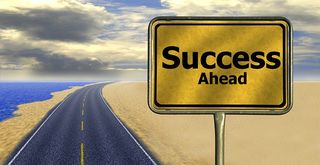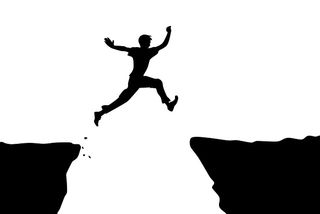Philosophy
A New Psychology for Weight Loss Plateaus
Your psychology about weight loss plateaus determines how you respond to them.
Posted June 7, 2019

Hitting a plateau is a common and upsetting experience for many people trying to lose weight. Far too often, motivated people embark on weight loss plans, commit to dietary and exercise changes, and see some initial progress on the scale . . . only to watch their weight loss slow and finally stop, even when the person has stuck with their program! Frustration and discouragement typically follow, along with decreased diet and exercise efforts that result in regaining whatever weight was lost.
When weight loss plateaus become synonymous with failure and relapse, we naturally view them as an enemy that we must either be lucky enough to avoid or be somehow strong enough to fight. However, rather than depending on luck or strength, what would help most people more is a better philosophy about plateaus. Consider the following counterintuitive ideas about weight loss plateaus:
- The long-term weight loss goal for most people is, counterintuitively, to reach a permanent plateau. That is, they want to reach their goal weight and then remain there indefinitely. Yet how is a person to remain at their long-term weight plateau without the practice and skills that come from learning to handle plateaus on the way to their goal?
- In the same way that “there is no failure, only feedback” (from businessman Robert G. Allen), weight loss plateaus are also simply a neutral form of feedback—a source of potentially valuable information to help us move forward—rather than a harbinger of doom.
- Rather than a weight loss plateau representing a personal failure or sign that a person cannot succeed, the reality is that everyone encounters plateaus from time to time. However, even though everyone encounters plateaus, not everyone responds to them the same way.
When we recognize that plateaus are a universal experience, a potential source of guidance, and even a long-term goal for us, it helps counter the widespread myth that plateaus are a sort of weight loss boogieman to fear and avoid. And when we lose the negative emotions about plateaus, it allows us to make more intentional choices about how to react to them.
Here is a summary of the traditional, self-limiting perspective on plateaus believed by the majority of people trying to lose weight compared to the more accurate and empowering perspective on plateaus practiced by the more successful minority.
Traditional plateau perspective Empowering plateau perspective
Enemy & obstacle Friend & guide
Sign of impending failure Feedback to help us progress
Signal your program will fail Signal to make adjustments
Sign to give up Sign to learn and adapt
React with impatience and anger React with patience and curiosity
Something must be wrong Plateaus are normal in weight loss
Your philosophy about weight loss plateaus will determine how well you respond to them. So why not consciously choose a philosophy that helps you rather than passively absorbing a philosophy from others that may be limiting you?
A practical approach to weight loss plateaus: the P.R.O.G.R.E.S.S. system

Because plateaus are so common among people trying to lose weight, it is possible to study how the people who are most successful with their weight loss respond to their plateaus and share these strategies with others. Recall that the author, Napoleon Hill, followed precisely this method to help people achieve their financial goals—studying the habits of the world’s most financially successful people and describing them for others to model—in his famous book, Think and Grow Rich. Were we to write our own book, call it Think and Grow Thin, the section on plateaus would contain the strategies below. To make the strategies easier to remember, they are ordered into the acronym PROGRESS.
Patience
The first strategy is also the simplest. Don’t react impulsively when weight loss slows or stalls. Many internal factors, such as changes in hormone and hydration levels and recent sodium intake, can affect your weight day-to-day. Stick with your program for at least two weeks before concluding that you’ve hit a plateau.
Revisit your personal reasons for weight loss
A common reason for weight loss plateaus is that we drift off track with our diet and exercise programs. Even small changes in portion sizes, food choices, and exercise volume/intensity can shift the balance from losing weight to merely maintaining weight. Reminding ourselves of the reasons why losing weight is important to us can often recharge our motivation and get the scale moving again.
Observe and collect data
Another proven plateau strategy is breaking out the food logs and exercise trackers again. Many people can make excellent weight loss progress without counting their steps and calories all the time. However, when progress stalls, that is when attending to the details is most important to help us respond effectively.
Gauge your results, adjust, and repeat
Many weight loss plateaus just need a nudge to get the scale moving again. If results have stalled, make a small to moderate change to your diet or exercise program, and give that change a week to see the impact. Big changes are usually overkill and often not sustainable, whereas making multiple changes makes it difficult to know what worked.
Reestablish accountability
It is no coincidence that people hit most of their weight loss plateaus when they are losing weight on their own. Although a few excel in this department, for most, it is difficult to be consistently accountable to yourself. For this reason, one of the most effective ways to break through a plateau is to reconnect with a workout partner, a weight loss group, or a personal trainer.
Expand your definition of success
A weight loss plateau is not always what it seems. While the number on the scale may not be changing, the rest of your body may still be improving. A good weight loss program doesn’t just reduce weight; it also improves how you feel, what you can do, how your clothes fit, and your muscle-to-fat ratio. Consider this your new and improved definition of success. If one or more of these latter areas are improving, then you’re likely progressing regardless of your scale weight.
Social support
Peer pressure works both ways. It can seduce us into bad habits, or it can inspire us to new levels of success. Few people do as well with weight loss on their own as they could with like-minded others. And remember that support needn’t mean a group—even one person is often enough—and quality counts far more than quantity.

Seek professional assistance
Last but hardly least, weight loss experts in dietetics, exercise, medicine, and psychology all have tools to help people manage plateaus. In the same way that even talented athletes need skilled coaches to fulfill their potential, so do many people benefit from a relationship with a skilled weight loss professional when they encounter plateaus or other obstacles.




